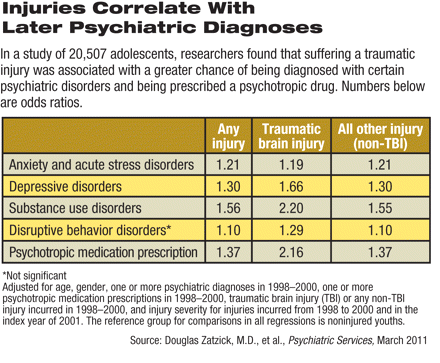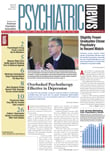Children and adolescents who suffer serious physical injuries appear to have a greater chance of developing psychiatric symptoms over the ensuing three years.
Analysis of data from 20,507 young people aged 10 to 19 enrolled in the Group Health Cooperative's health plan in Washington state showed that the odds of being diagnosed with anxiety, depression, or substance use were higher among youth who had sustained traumatic injuries. They also were more likely to receive a prescription for a psychotropic medication, wrote Douglas Zatzick, M.D., and David Grossman, M.D., M.P.H., in their report in the March Psychiatric Services.
"This study shows that systems of care are needed to integrate injury into a care plan and service delivery," said Frederick J. Stoddard Jr., M.D., an associate clinical professor at Harvard Medical School, a psychiatrist at the Massachusetts General Hospital, and chief of psychiatry at the Shriners Burns Hospital for Children. The main focus of Stoddard's clinical care, teaching, and research is with children and adolescents with burn injuries, but he was not involved in Zatzick and Grossman's study.
The elevation of risk was important because most of the injuries were not severe, said the authors.
Zatzick is a professor of psychiatry and behavioral science and medical director of the inpatient consultation-liaison service at the University of Washington School of Medicine. Grossman is a professor of health services and an adjunct professor of pediatrics there.
They reviewed data from 1998 to 2004 and divided the youth into two groups based on whether they had an ICD-9-CM coded injury visit in 2001. In that year, the youngsters' average age was 14, and 30 percent (n=6,116) recorded at least one injury visit.
About 13 percent of the injured youth received a psychiatric diagnosis in 2002, 14.2 percent did so in 2003, and 14.5 percent did so in 2004. Over that same time, from 10.8 percent to 11.7 percent received at least one prescription for a psychotropic medication.
After adjusting for clinical and demographic factors, the researchers found that the injured youngsters had increased odds of receiving a diagnosis of anxiety and acute stress disorders, depressive disorders, or substance use disorders. They also had greater odds of being prescribed a psychotropic medication.
The youth who had suffered a traumatic brain injury also had elevated rates of depression or substance use disorder diagnoses and of psychotropic medication prescriptions, compared with uninjured youth. However, they showed no greater odds of developing a psychiatric disorder than did youth whose injuries were other than traumatic brain injuries.
The researchers found a correlation between pre-injury psychiatric history and psychiatric diagnoses after injury in 2001, but that wasn't the full story.
"We adjusted for prior psychiatric diagnosis and found that injury contributes to later diagnosis above and beyond pre-event diagnosis," Zatzick told Psychiatric News. Injury could not, however, be established as a cause of the psychiatric diagnosis, he said.
"But injury is a good proxy for children who need psychiatric screening for psychiatric disorders and may need treatment," said Stoddard.
Posttraumatic stress disorder was diagnosed "infrequently" over the three-year follow-up period and so was included among other anxiety disorders in their classification, said the authors.
They recommended a stepped-care model with initial population-based screening, followed by treatment in pediatric primary care, with referral to mental health specialists for youth with persistent symptoms, said Zatzick.
Other specialists can be involved as well, even if that requires a little innovation, he added.
"Psychiatrists are accustomed to working with primary care doctors, but not often with surgeons," noted Stoddard.
Zatzick has been doing just that. He collaborated with University of Washington Harborview colleagues, including trauma surgeons Gregory Jurkovich, M.D., and Larry Gentilello, M.D., on a review of the scientific evidence on alcohol screening and brief intervention. Their work helped persuade the American College of Surgeons (ACS) to mandate alcohol screening and intervention services at accredited U.S. level I and II trauma centers.
The team is working now toward developing similar ACS guidelines for PTSD screening and intervention at U.S. trauma centers.
Stoddard agreed.
"Psychiatrists whose practices do not ordinarily involve injury patients should inquire about a possible history of injury, either as a possible etiological factor for a psychiatric disorder such as PTSD, or as a potential problem in treatment such as an added source of stigma or disability, or a factor contributing to depression or self-esteem problems related to body image," said Stoddard.

